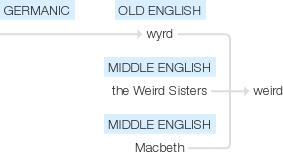Weird
Old English wyrd ‘destiny’, of Germanic origin. The adjective (late Middle English) originally meant ‘having the power to control destiny’, and was used especially in the Weird Sisters, originally referring to the Fates, later the witches in Shakespeare's Macbeth ; the latter use gave rise to the sense ‘unearthly’ (early 19th century).
wiktionary
From Middle English werde, wierde, wirde, wyrede, wurde, from Old English wyrd(“fate”), from Proto-West Germanic *wurdi, from Proto-Germanic *wurdiz, from Proto-Indo-European *wert-(“to turn, wind”). Cognate with Icelandic urður(“fate”). Related to Old English weorþan(“to become”). Doublet of wyrd. More at worth.
Weird was extinct by the 16th century in English. It survived in Scots, whence Shakespeare borrowed it in naming the Weird Sisters, reintroducing it to English. The senses "abnormal", "strange" etc. arose via reinterpretation of Weird Sisters and date from after this reintroduction.
etymonline
weird (adj.)
c. 1400, "having power to control fate," from wierd (n.), from Old English wyrd "fate, chance, fortune; destiny; the Fates," literally "that which comes," from Proto-Germanic *wurthiz (source also of Old Saxon wurd, Old High German wurt "fate," Old Norse urðr "fate, one of the three Norns"), from PIE *wert- "to turn, to wind," (source also of German werden, Old English weorðan "to become"), from root *wer- (2) "to turn, bend." For sense development from "turning" to "becoming," compare phrase turn into "become."
The sense "uncanny, supernatural" developed from Middle English use of weird sisters for the three fates or Norns (in Germanic mythology), the goddesses who controlled human destiny. They were portrayed as odd or frightening in appearance, as in "Macbeth" (and especially in 18th and 19th century productions of it), which led to the adjectival meaning "odd-looking, uncanny" (1815); "odd, strange, disturbingly different" (1820). Related: Weirdly; weirdness.
